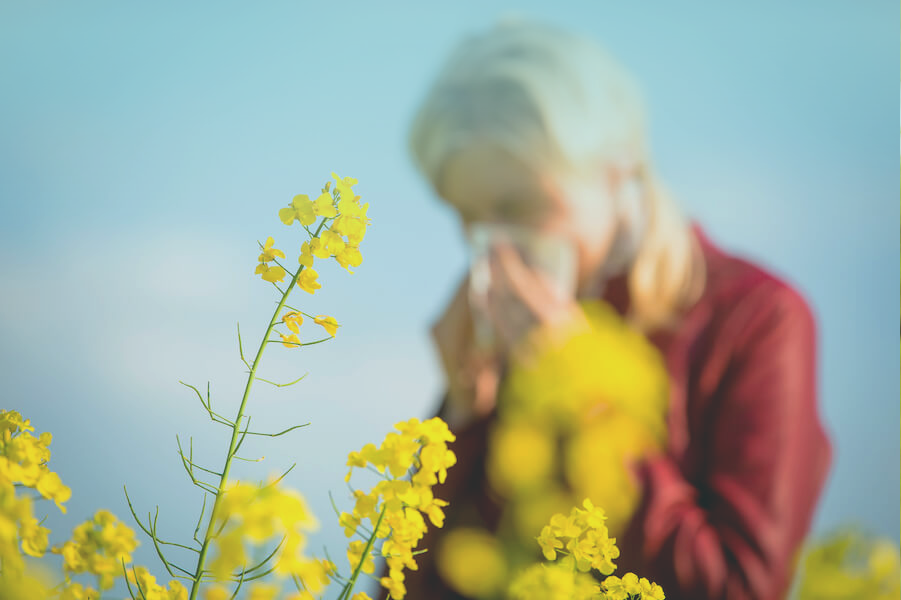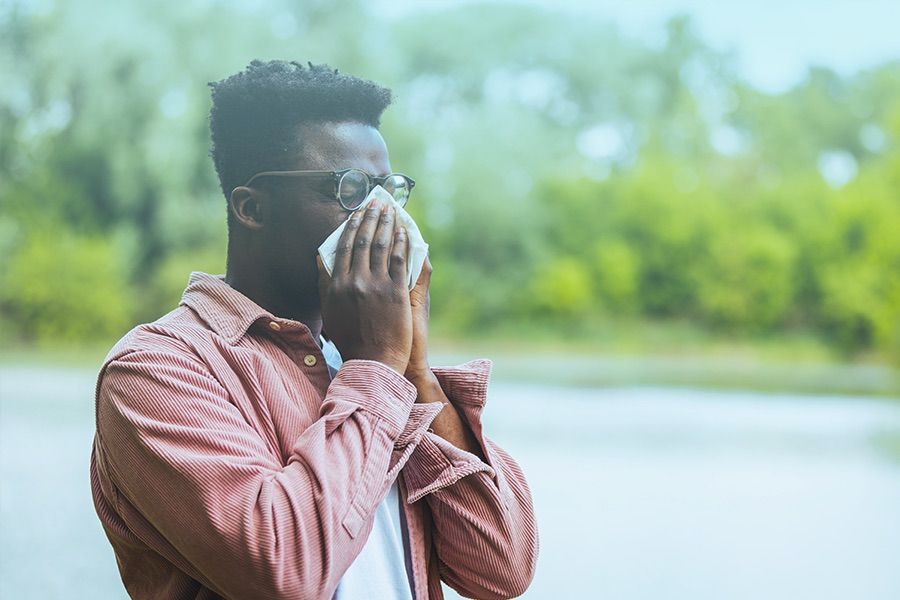Breathe Freely

Allergy Trends by Region: Your Guide to the Worst Cities and States for Allergies
Allergies are never fun to deal with, but their symptoms—and severity—can vary significantly depending on where you call home. Here, we'll dive into regional allergy variations and why they matter. Plus, we'll shed light on personalized solutions, like Quello’s at-home allergy tests, that can make your journey to allergy freedom smooth, no matter where you live!
The Top 10 Worst Cities for Allergies
Curious about which cities are notorious for being allergy hotspots? According to the Asthma and Allergy Foundation of America (AAFA), these are the 10 worst cities for allergies based on the severity of seasonal allergy conditions, average allergy medicine use, and the availability of allergy specialists.
<style>
.my-class {
overflow: auto;
width: 100%;
}
.my-class table {
border: 1px solid #DEDEDF;
height: 100%;
width: 70%;
table-layout: fixed;
border-collapse: collapse;
border-spacing: 1px;
text-align: left;
}
.my-class caption {
caption-side: top;
text-align: left;
}
.my-class th {
border: 1px solid #DEDEDF;
background-color: #ECEFF1;
color: #000000;
padding: 5px;
}
.my-class td {
border: 1px solid #DEDEDF;
background-color: #FFFFFF;
color: #000000;
padding: 5px;
}
</style>
<div class="my-class" role="region" tabindex="0">
<table>
<caption><h3>Worst Cities for Allergy Suffers</h3></caption>
<thead>
<tr>
<th><center>Rank</center></th>
<th>City</th>
</tr>
</thead>
<tbody>
<tr>
<td><center>#1</center></center></td>
<td>Wichita, Kansas<br></td>
</tr>
<tr>
<td><center>#2</center></td>
<td>Dallas, Texas</td>
</tr>
<tr>
<td><center>#3</center><br></td>
<td>Scranton, Pennsylvania</td>
</tr>
<tr>
<td><center>#4</center></td>
<td>Oklahoma City, Oklahoma</td>
</tr>
<tr>
<td><center>#5</center></td>
<td>Tulsa, Oklahoma</td>
</tr>
<tr>
<td><center>#6</center></td>
<td>Sarasota, Florida</td>
</tr>
<tr>
<td><center>#7</center></td>
<td>Cape Coral, Florida</td>
</tr>
<tr>
<td><center>#8</center></td>
<td>Orlando, Florida</td>
</tr>
<tr>
<td><center>#9</td>
<td>Des Moines, Iowa</td>
</tr>
<tr>
<td><center>#10</center></td>
<td>Greenville, South Carolina<br></td>
</tr>
<tbody>
</table>
And, as a little bonus, here are the AAFA’s 10 best cities for allergy sufferers. Fingers crossed yours is on the list!
<style>
.my-class {
overflow: auto;
width: 100%;
}
.my-class table {
border: 1px solid #DEDEDF;
height: 100%;
width: 70%;
table-layout: fixed;
border-collapse: collapse;
border-spacing: 1px;
text-align: left;
}
.my-class caption {
caption-side: top;
text-align: left;
}
.my-class th {
border: 1px solid #DEDEDF;
background-color: #ECEFF1;
color: #000000;
padding: 5px;
}
.my-class td {
border: 1px solid #DEDEDF;
background-color: #FFFFFF;
color: #000000;
padding: 5px;
}
</style>
<div class="my-class" role="region" tabindex="0">
<table>
<caption><h3>Best Cities for Allergy Sufferers</h3></caption>
<thead>
<tr>
<th><center>Rank</center></th>
<th>City</th>
</tr>
</thead>
<tbody>
<tr>
<td><center>#1</center></center></td>
<td>Salt Lake City, Utah<br></td>
</tr>
<tr>
<td><center>#2</center></td>
<td>Columbus, Ohio</td>
</tr>
<tr>
<td><center>#3</center><br></td>
<td>Albuquerque, New Mexico</td>
</tr>
<tr>
<td><center>#4</center></td>
<td>Detroit, Michigan</td>
</tr>
<tr>
<td><center>#5</center></td>
<td>Washington, DC</td>
</tr>
<tr>
<td><center>#6</center></td>
<td>Akron, Ohio</td>
</tr>
<tr>
<td><center>#7</center></td>
<td>Austin, Texas</td>
</tr>
<tr>
<td><center>#8</center></td>
<td>Cleveland, Ohio</td>
</tr>
<tr>
<td><center>#9</td>
<td>Seattle, Washington</td>
</tr>
<tr>
<td><center>#10</center></td>
<td>Buffalo, New York<br></td>
</tr>
<tbody>
</table>
Climate Change's Impact on Allergies
Climate change isn't just about rising temperatures and melting ice caps; it's also messing with your allergies. Two key effects of climate change are impacting allergies: lengthening allergy seasons and skyrocketing pollen levels. Let’s take a closer look.
Lengthening Allergy Seasons
Rising temperatures caused by climate change lead to longer allergy seasons. According to experts, warmer weather signals plants to bloom sooner, so pollen seasons are starting earlier and lasting longer. In some of the most affected regions, allergy seasons can start 20 days earlier, persist 10 days longer, and feature 21% more pollen than we’ve experienced in the last few decades, with the greatest increases recorded in Texas and the Midwestern U.S. This is why keeping an eye on local data is crucial for choosing effective treatments, such as allergy drops.
Increased Pollen Levels
Pollen levels are also on the rise, especially in regions that are seeing the greatest temperature impacts of climate change. Combined with the heightened concentrations of carbon dioxide from greenhouse gas emissions, this rise in temperature causes plants to produce and release more pollen—leading to more pesky symptoms for allergy sufferers!

Regional Allergy Variations
Geographical factors and medical infrastructures need to be examined as well. Since each region of the U.S. has varying climates, plant life, and air quality, there are many differences between the types of allergens each produces. An additional factor to consider is the number of medical specialists who are available to help ease the discomfort of allergy symptoms.
Geographical Factors
Geographical factors like climate, humidity, rainfall, and others will affect which allergens are most prevalent and how much of the year they’re a problem. In the Southeast and along the East Coast, for example, trees, grasses, and ragweed release pollen starting in early spring and through late fall. In the Pacific Northwest, allergy season starts with tree pollen in late winter, with grass pollen peaking in midsummer.
Unfortunately, indoor allergens like dust mites and mold can take hold in any geography or climate, so they are prevalent throughout the U.S.
Medical Infrastructure
Access to allergy specialists and medications can be a game-changer. Rural areas face unique challenges when it comes to health care, including reduced access to allergy specialists which in turn creates barriers to getting the right treatment. Online providers, such as Quello, can open up opportunities for allergy-ridden folks to get easy, at-home allergy testing and treatment to help alleviate symptoms.
City-Specific Allergy Triggers
Urbanites, listen up! City life has its perks, but it also brings unique allergy triggers. Thankfully, there are ways to limit how allergies affect city dwellers. Here’s a breakdown of how the impact of allergies changes in major cities, followed by a few recommendations for precautions you can take to keep your symptoms in check.
Urban Air Pollution
With urban populations on the rise, urban air quality is getting worse—and that can exacerbate allergies. Not only does air pollution negatively affect respiratory health overall, but it can also increase the allergen content of pollen. The development of deliberate green spaces with low-allergenic trees and grasses in urban areas can help improve air quality while curbing the overdevelopment of allergens throughout the year.

Strategies for Managing Allergies by Region
Enough with the doom and gloom—it's time for solutions for managing your allergies, including medication options and environmental tactics. And hey, if you're looking for a tailored plan, try our free allergy test kit and we’ll get to work on some allergy drops, custom-made just for you.
Diet and Lifestyle Choices
Your diet and lifestyle choices influence your allergy symptoms more than you might think! Simple changes to your eating habits can counteract the mucus-producing effects of certain foods, like dairy products, refined carbohydrates, and eggs.
What’s an easy one? Think spicy! Yes, spicy foods, spices, and ginger thin out mucus and can help you decongest. Additionally, incorporating more fresh vegetables and clean protein into your lifestyle can help fight allergies during long seasons.
Adapting to local allergy triggers is another key to staying comfortable. Some tips to help limit your exposure to allergens are:
- Stay indoors on windy days (and keep your windows closed!)
- Don’t garden, hike, or do other outdoorsy activities on high-pollen-count days
- Wear a mask while outdoors
- Vacuum and dust your home often
- Frequently wash covers, blankets, and pillows
Medication Options
Different regions might require different approaches to medication. As mentioned before, there are certain regions where it’s difficult to find allergy specialists who can provide effective, long-term treatments without breaking the bank if insurance doesn’t cover it. Allergy shots are common medical treatments for severe allergies, but those that require doctor visits and can be extremely inconvenient.
An alternative is allergy drops, like those Quello provides. These offer a simple, effective way to battle allergies, all from the comfort of your own home. Better yet, Quello offers a free at-home testing kit, so your drops are customized just for you.
Prepare for Your Region's Allergy Trends
Regional allergy variations can be a real challenge, but they're not insurmountable. If you reside in one of the worst cities for allergies, take the necessary precautions and make smart choices about your outdoor exposure when allergy season is at its peak.
As you prepare to face your region's allergy trends head-on, remember that you can control how allergies affect you. Quello is here to support you on your journey to becoming an allergy overcomer! Our allergy drops are safe and convenient: no shots, no side effects, and no long waits in the clinic—just a path to an allergy-free life, one drop at a time.

Overcome your allergies at home with our doctor-led therapy.
Get started with our free allergy test kitGet Started with no test needed.
Overcome your allergies at home with our doctor-led therapy.
Get started with our free allergy test kitGet Started with no test needed.

